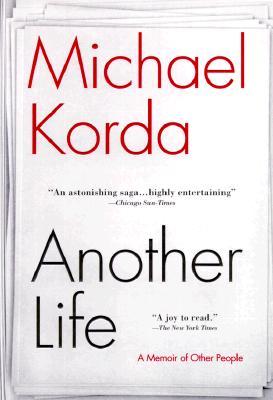Since I work in the publishing industry, I’m always on the lookout for books about it. Surprisingly, considering that the publishing industry’s main purpose is to put out books, there don’t seem to be that many. Sure, there are hundreds of books about how to get your book published and how to find an agent, but I’ve only found a handful of books about the history of the industry itself, or what the job of an editor or publisher is actually like.
 Michael Korda wrote one of those books—sort of. Korda started as an editor at Simon & Schuster in the late 1950s and worked there for decades, eventually becoming editor in chief. His memoir, Another Life: A Memoir of Other People, published in 1999, looks back on his years in the publishing industry. His book contains precious little about the nuts and bolts of being an editor, aside from being able to get through a manuscript quickly and be able to make accurate judgments about it from that initial reading. Most of his book involves reminiscing about various characters he encountered in his years at S&S, the “other people” of the subtitle.
Michael Korda wrote one of those books—sort of. Korda started as an editor at Simon & Schuster in the late 1950s and worked there for decades, eventually becoming editor in chief. His memoir, Another Life: A Memoir of Other People, published in 1999, looks back on his years in the publishing industry. His book contains precious little about the nuts and bolts of being an editor, aside from being able to get through a manuscript quickly and be able to make accurate judgments about it from that initial reading. Most of his book involves reminiscing about various characters he encountered in his years at S&S, the “other people” of the subtitle.
Korda was raised in England, the son of a Hungarian family that had made its fortune in the film industry. In his 20s he set out for the United States, and landed at S&S. Most of his early stories about his time in publishing involve people that I, born in 1979, had never heard of: Harold Robbins. Irving Wallace. Jacqueline Susann. As the book went along, though, I encountered a few whose fame has outlasted them, like Tennessee Williams, and the presidents Richard Nixon and Ronald Reagan. Many of them seem to have had difficult personalities; of all the people profiled in the book, there are precious few of them I would actually like to meet.
Aside from the anecdotes, the most interesting part about the book was its chronicle of the transition of publishing companies from being small and privately held when Korda started out, to going public, to becoming a slice of multimedia conglomerates today. In spite of that transition and the changes it wrought, Korda emphasizes near the end of the book that the mysterious craft of editing still plays a major role. The reading public is smart: no matter whose name is attached to a book, if it’s not good it won’t sell. People are still needed who can read a manuscript quickly, make a judgment about whether it contains the makings of a good book, and figure what is wrong with it and how to fix it.